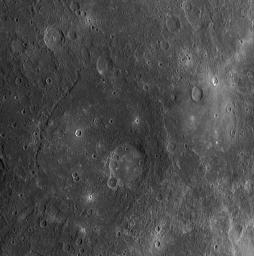Five of Five: The Last Scene in a High-resolution Color Mosaic
Caption:
During MESSENGER's second Mercury flyby, the first images that were taken following closest approach were acquired using the WAC's 11 narrow-band color filters. Five different scenes were acquired in 11 filters each, resulting in 55 images total that comprise a 5 column x 1 row mosaic. The individual WAC image shown here is the fifth scene of that 5x1 mosaic. The large, smooth-floored crater near the center of the image is Titian, named in honor of Tiziano Vecellio, the Italian Renaissance painter. Scenes
one
,
two
,
three
, and
four
of this mosaic can be viewed in previously released images. Though the entire 5x1 mosaic only took about six minutes to be obtained, the resolution of the images changed by a factor of two between scene one and scene five shown here, as the MESSENGER spacecraft sped away from Mercury. An enhanced color movie using images from this mosaic has also been released (see
PIA11416
).
Date Acquired:
October 6, 2008
Image Mission Elapsed Time (MET):
131770676
Instrument:
Wide Angle Camera (WAC) of the Mercury Dual Imaging System (MDIS)
WAC Filter:
7 (750 nanometers)
Resolution:
580 meters/pixel (0.36 miles/pixel)
Scale:
Titian crater is 121 kilometers (75 miles) in diameter
Spacecraft Altitude:
3,200 kilometers (2,000 miles)
Background Info:
These images are from MESSENGER, a NASA Discovery mission to conduct the first orbital study of the innermost planet, Mercury. For information regarding the use of images, see the MESSENGER
image use policy
.
Cataloging Keywords:
| Name |
Value |
Additional Values |
| Target |
Mercury |
|
| System |
|
|
| Target Type |
Planet |
|
| Mission |
MESSENGER |
|
| Instrument Host |
MESSENGER |
|
| Host Type |
Orbiter |
|
| Instrument |
Mercury Dual Imaging System (MDIS) |
|
| Detector |
Wide Angle Camera (WAC) |
|
| Extra Keywords |
Crater, Grayscale |
| Acquisition Date |
|
| Release Date |
2008-12-15 |
| Date in Caption |
2008-10-06 |
|
| Image Credit |
NASA/Johns Hopkins University Applied Physics Laboratory/Carnegie Institution of Washington |
| Source |
photojournal.jpl.nasa.gov/catalog/PIA11765 |
| Identifier |
PIA11765 |

 Planetary Data System
Planetary Data System
